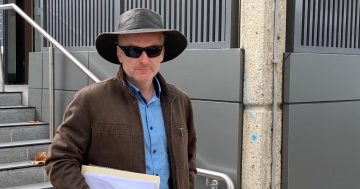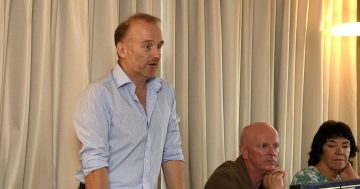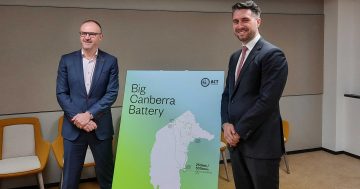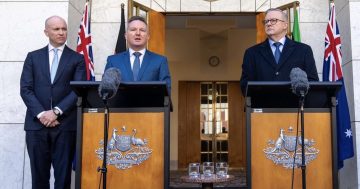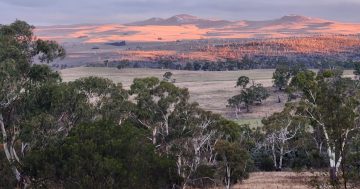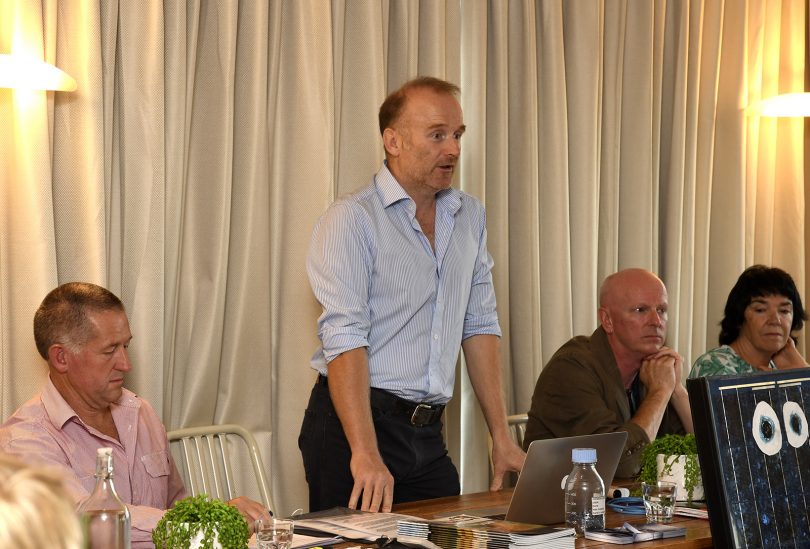
Monaro candidates Mick Holton, Andrew Thaler, Peter Marshall and Frankie Seymour (pictured at Jindabyne) Photo: Steve Cuff, Snowy Mountains magazine.
The key issues for the Federal election are still up in the air, but if the Monaro candidates’ debate this week was anything to go by, there are plenty of people who believe the NSW election on March 23 will be at least partly a referendum on climate action.
Repower Monaro organised the forum, held in front of a near capacity crowd at the Queanbeyan Kangaroos Rugby League club and attended by five of the six candidates for the seat. NSW Deputy Premier and Member for Monaro John Barilaro sent his apologies for his absence, greeted with some scepticism by the audience.
And while approaches differed, there was a reasonably broad consensus that climate change is real and requires action. Mick Holton, running for the Shooters, Fishers and Farmers Party strongly believes that land management is at the core of many current problems, including river health, drought and bushfires.
He was critical of the degree to which national parks are locking up land which he said deserves better management, and believes the Parks system urgently needs increased funding. Mr Holton is an advocate for a pre-European indigenous fire management regime which he believes would restore the health of Australia’s bush country.
QPRC councillor and rural firefighter Peter Marshall of The Greens spoke of the vital importance of public transport for the economy and specifically to assist in the adoption of renewable energy systems. He cited the massive energy cost of air freight compared to high-speed rail, arguing that air freight should be restricted to essentials.
He emphasised that transport was just one area where renewable energy needed to be adopted, naming ‘food miles’ and ‘school miles’ and the great energy costs of contemporary building practices. He noted that current building ownership did not favour the installation of renewable energy, but that Green energy policy would benefit building owners and landlords as well as tenants.
Labor candidate Bryce Wilson described his own background: originally from Griffith (NSW), he became a science teacher before working as an adviser to Peter Garrett during his time as Minister for Education.
He re-affirmed his opposition to nuclear power, and cited Federal MP Mike Kelly’s support for renewables and specifically the Snowy 2.0 plan. Mr Wilson said that Labor (NSW) has “committed to 50 per cent renewables by 2030”, to deliver seven gigawatts of energy, and to create a state-owned renewable energy company to deliver a further one gigawatt of renewable energy and storage.
Animal Justice Party activist Frankie Seymour noted the association of climate change, drought, and animal cruelty. She said that a declining demand for animal products is in accord with her party’s policies to end cruelty to “all sentient beings” whether pigs, sheep, cattle, roos or horses.
She described her party’s vision of a restored landscape in which degraded pastures would become fruitful wildlife habitat, and cruelty becomes a thing of the past. Her party supports the early adoption of non-fossil-fuel energy.
Andrew Thaler, who is standing as an Independent, is a long-time electrical engineer and owns two solar farms, describing himself as well qualified to assess the merits of renewable energy. He supported his remarks by using props including an early-model solar panel and samples of silicon.
He observed that many components of a renewable energy system require sophisticated manufacturing and sometimes rare minerals. He stated that while renewable energy would become increasingly important, there would be a very long development period before it became commonplace. In the meantime, he supported the safe and modern application of nuclear power.
Wide-ranging debate followed, touching on carbon drawdowns, the fragile state of the high country including the impact of both Snowy Hydro and feral horses, native vegetation and subsidies for exiting coal-fired electricity generation.
Mr Barilaro was present at the Jindabyne candidates’ forum last week, where he said he had no doubts that investment in coal-fired energy was drying up, adding that the NSW Nationals believed in climate change and that in contrast to their Federal colleagues, were committed to the National Energy Guarantee.
“We have a zero net emission target by 2050, and we are supporting a $10 million investment in solar and wind. We have 50 hydro projects across NSW, and we’ve announced 300,000 zero interest loans across NSW for solar and battery storage,” he said.
Describing himself as “technology agnostic”, Mr Barilaro said the Coalition government also prioritised creating incentives for homes and small businesses to reduce energy consumption.
Words by Nick Golde from Repower Monaro.












